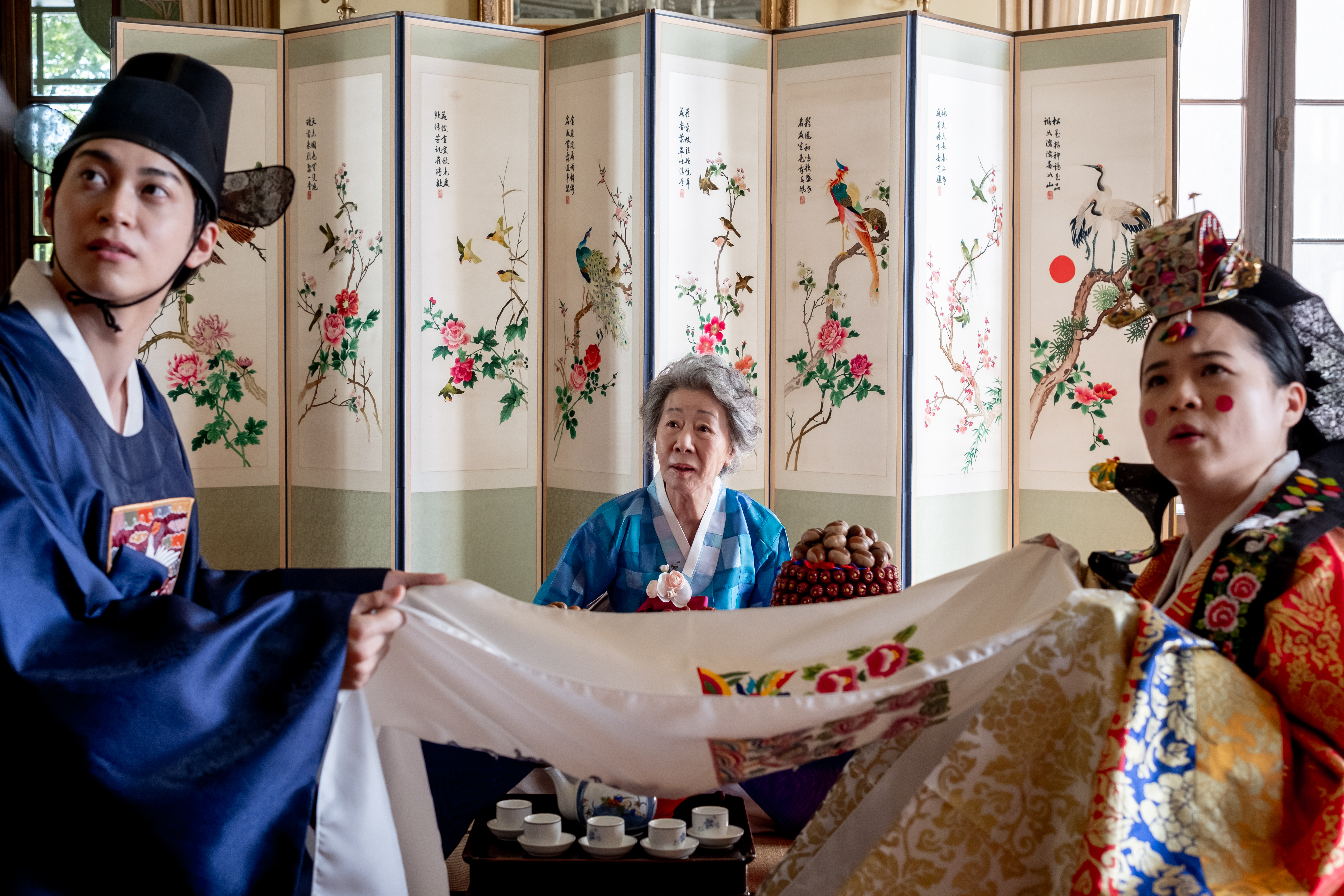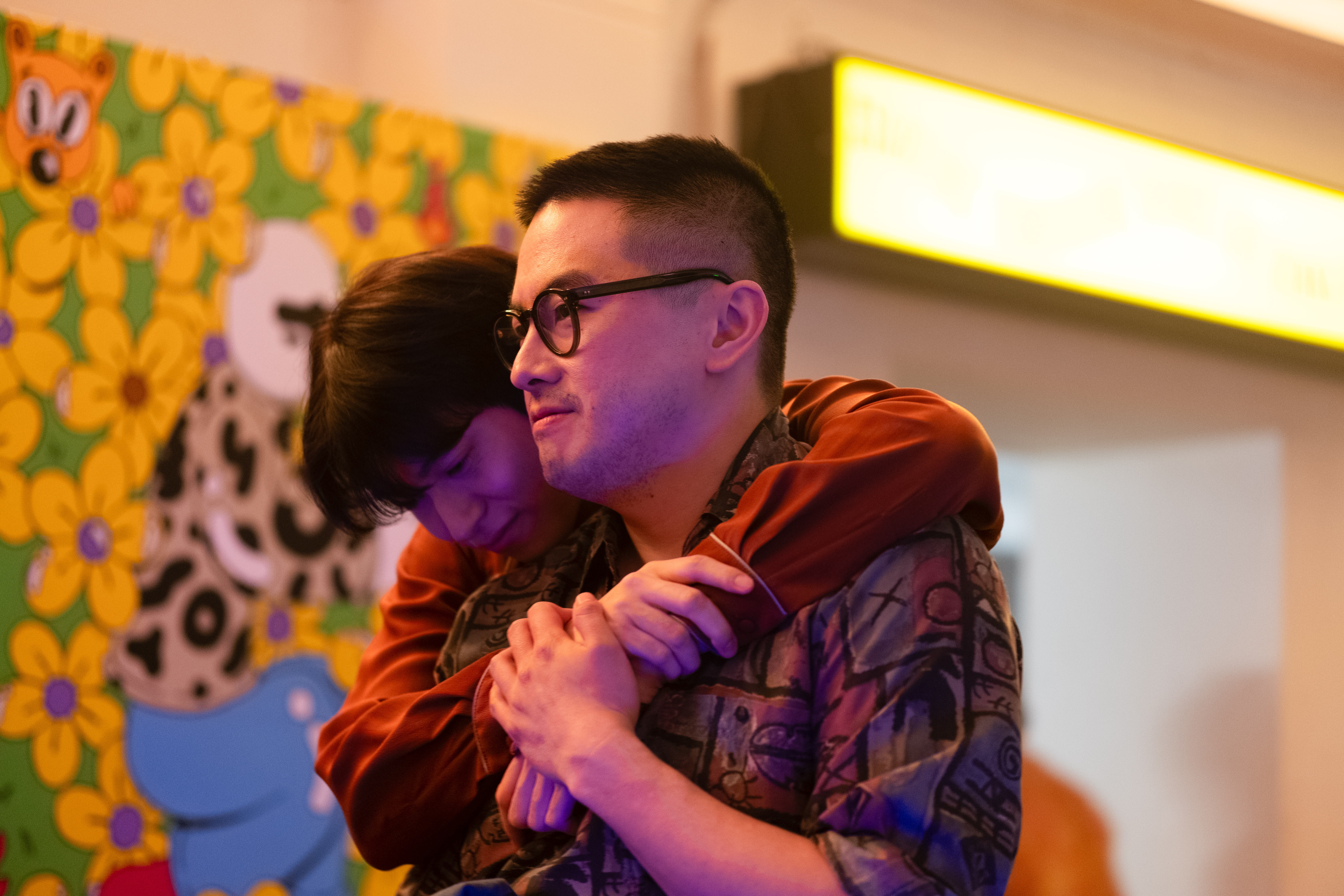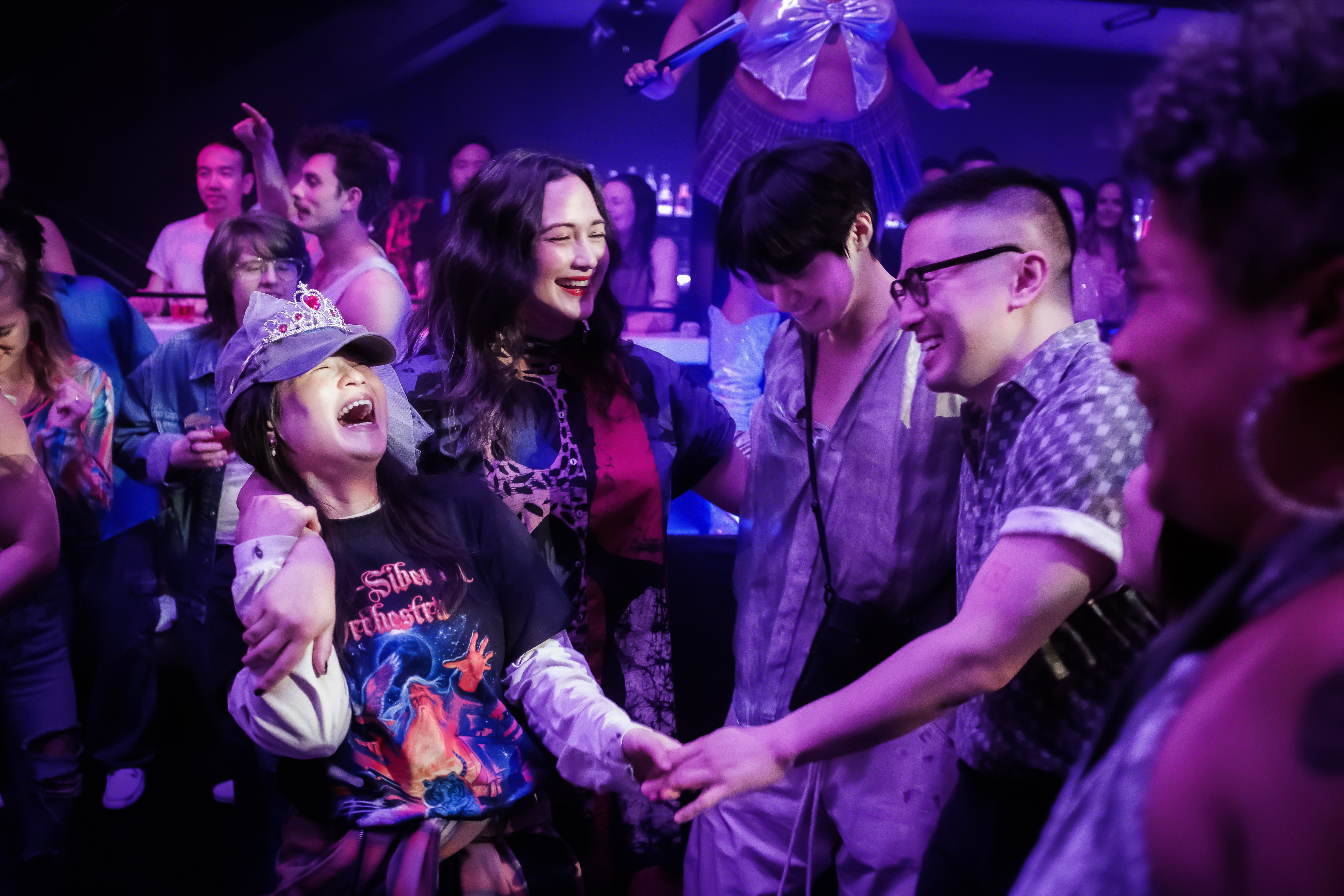Youn Yuh-Jung knows that life rarely follows best-laid plans. After she took home the Oscar for Best Supporting Actress for her role in Minari in 2021, the 77-year-old Korean film icon had no plans to return to the world of American indie film. She spoke candidly during her awards press run about the challenges of Minari’s low-budget production. Her past few projects, including Apple TV+’s multi-lingual epic Pachinko and the Korean rom-com Dog Days, allowed her to stay close to home. Then came the offer for Andrew Ahn’s remake of Ang Lee’s 1993 comedy, The Wedding Banquet. Youn was initially hesitant, but eventually signed on for the same reason she will always have ties to the U.S.: her family.
Youn has two adult sons whom she welcomed while living in the U.S. during her 10-year hiatus from acting between 1974 and 1984. They both live in America; Youn accepted her role in Minari, her first American film in her 50-year acting career, partly for the chance to see them. Speaking to Marie Claire over Zoom (with her younger son and manager Nuel Cho helping to translate), Youn explains that the queer rom-com hit close to home because her eldest, who identifies as gay, encouraged her to take the role. And thankfully, filming The Wedding Banquet in cloudy Vancouver, rather than under the Oklahoma sun, made the experience all the more enjoyable. “Compared with that one, this one was a luxury to me,” she says.

Ja-young (Youn Yuh-jung, center) helps Min (Han Gi-chan, left) and Kelly (Kelly Marie Tran, right) with a wedding ritual.
(Image credit: Bleecker Street/ShivHans Pictures)
In Ahn’s updated version of The Wedding Banquet, which arrives in theaters on April 18, Youn plays Ja-young, the Korean matriarch of a multinational corporation whose closeted grandson Min (K-drama actor Han Gi-Chan) is a student in Seattle. Ja-young believes it’s time for Min to come home and join the family empire, but he’s in a committed relationship with commitment-averse Chris (Bowen Yang). So Min thinks up a scheme: He’ll marry Chris’s best friend Angela (Kelly Marie Tran) for a green card, in exchange for paying for her and her girlfriend Lee’s (Lily Gladstone) IVF treatments. The plan immediately blows up when Min’s halmoni makes a trip to meet her grandson’s new bride—and shows that she isn’t as easy to fool as he thinks.
The Wedding Banquet ended up being an intimate collaboration between Ahn and Youn, with the director and actress crafting her role together based on her personal experience. Youn even helped write a late, emotional scene between grandmother and grandson, where she questions why he felt he needed to hide himself. South Korea remains conservative towards LGBTQ+ rights, making this moment hit hard, knowing how closely art reflects life for the most famous Korean actress of her generation. “I hope it can release in Korea,” Youn says of the film. “I hope we can wake them up and open their eyes.”

Min (Han Gi-chan) and Chris (Bowen Yang) at the start of The Wedding Banquet.
(Image credit: Bleecker Street/ShivHans Pictures)
Below, Youn chats with Marie Claire about her “never say never” attitude towards her career, how she tested Han before filming, and what Korean entertainment fans tend to forget about the country.
Marie Claire: The Wedding Banquet is your first Western film role since Minari. Why did you choose to take on this role?
Youn Yuh-jung: My roles in Western movies [tend to] be very limited because I don’t speak English well, or I don’t know the culture that well. This film was written by Andrew Ahn, who is Korean American, so we have some similar culture between him and me. I was thinking, because I’m a very old lady, coming here is a big job for me. I was wondering if I should go to America again and then do an independent film, with that atmosphere and circumstance. I was hesitant, and then I spoke with my two sons. My youngest son said, ‘Okay mom, this is an indie movie, so why don’t you skip this one? You can relax in your country.’ He suggested sending the script to my older son, [who] is a fan of Andrew Ahn. He can trust him. So my first son suggested, ‘Well you should do it. It’s a good role for you.’ So we had a family discussion and I decided to do it.
MC: What was your experience working with Andrew Ahn? Is it important to you to continue to work with Korean-American directors?
YY: I’m not sure about my future because, you know, life doesn’t go as you planned. I learned that lesson a long time ago. So I won’t say, ‘I’ll do this,’ or, ‘I won’t do this.’ I’m not going to promise anything. But I think with Korean American directors, as an older actor from Korea, maybe they are like my kids, my boys. My heart goes with them, so I follow my heart.

The Wedding Banquet quartet, from left: Angela (Kelly Marie Tran), Lee (Lily Gladstone), Min (Han Gi-chan), and Chris (Bowen)
(Image credit: Bleecker Street/ShivHans Pictures)
MC: What was your experience working with Han Gi-chan in his first Western film role?
YY: In the original script, he was supposed to be my son, but I found out that he’s much younger than my sons’ ages. So I suggested to Andrew, ‘No, he cannot be my son. He could be my grandson.’ On the first day we met, Andrew and Gi-chan came over to the apartment where I was staying. As soon as he walked in the door, I said, ‘Sit. Okay, open your script, let’s go.’ There was not much of a hi or a hello. It was a ‘let’s go,’ and they were pretty surprised. I was testing him. Maybe Andrew thought I was very harsh on him, but if he wants to be a professional, he has to be ready. That’s my philosophy about acting. Gi-chan did really good on the first read-through. He passed my test.
MC: I appreciated that your character saw through her grandson’s ruse very early. In Ja-young’s backstory, how long has she suspected that Min is gay?
YY: Maybe since Min was a young boy, because Ja-young raised him instead of his parents. His parents passed away before he got older, so she was watching him. Maybe she sensed that he was different than other boys. But Min never spoke about that situation or his identity in Korea. Our country is very conservative, so coming out to their parents is, I think, harder than coming out between friends. That was my thought about that role.
With Korean American directors, as an older actor from Korea, maybe they are like my kids. My heart goes with them, so I follow my heart.
MC: How would you describe the level of personal conflict Ja-young has as a chaebol to someone who isn’t familiar with Korean culture?
YY: It’s especially because of all the public eyes on their company. Then, if he comes out as gay, he’s not going to inherit any money from his grandfather, so she’s trying to protect him. All she was thinking about was protecting him as a family member. I think that idea of trying to have a fake wedding to put in the newspaper, that showed the love between Ja-young and Gi-chan. That’s why he appreciated the plan.
MC: The fake wedding allows Ja-young to observe how happy Min is in his relationship. When you first discussed the role, was it important that she gradually became more accepting?
YY: Andrew and I developed that story between sharing his experience and my experience. I actually wrote my lines between Gi-chan and Ja-young at the end of the film, because Andrew understood. He accepted that I was going to write this dialogue between Ja-young and Gi-chan, [which] I of course got approved. My important line, it was not in the script, but in Korean, I said, ‘Whether you are straight or gay, first of all, you are my grandson.’ That was very important. I think those lines were my personal feelings to Gi-chan, and my personal experience.
MC: What do you hope viewers take away from the film?
YY: I hope it can release in Korea. We are a very conservative society, so they’re not accepting of gay marriage, or coming out as a gay to a mother or father. Korean culture is so in the microscope of the world now. The world sees us as modern and futuristic, but you have to be reminded sometimes. We’re such a young country. I was born in 1947. We didn’t get our first president until 1953, so I was 6 when we first became a country. You have to put that into perspective, which explains a lot of our conservative values that still exist. So I hope we can wake them up and open their eyes.
This interview has been edited and condensed for clarity.

